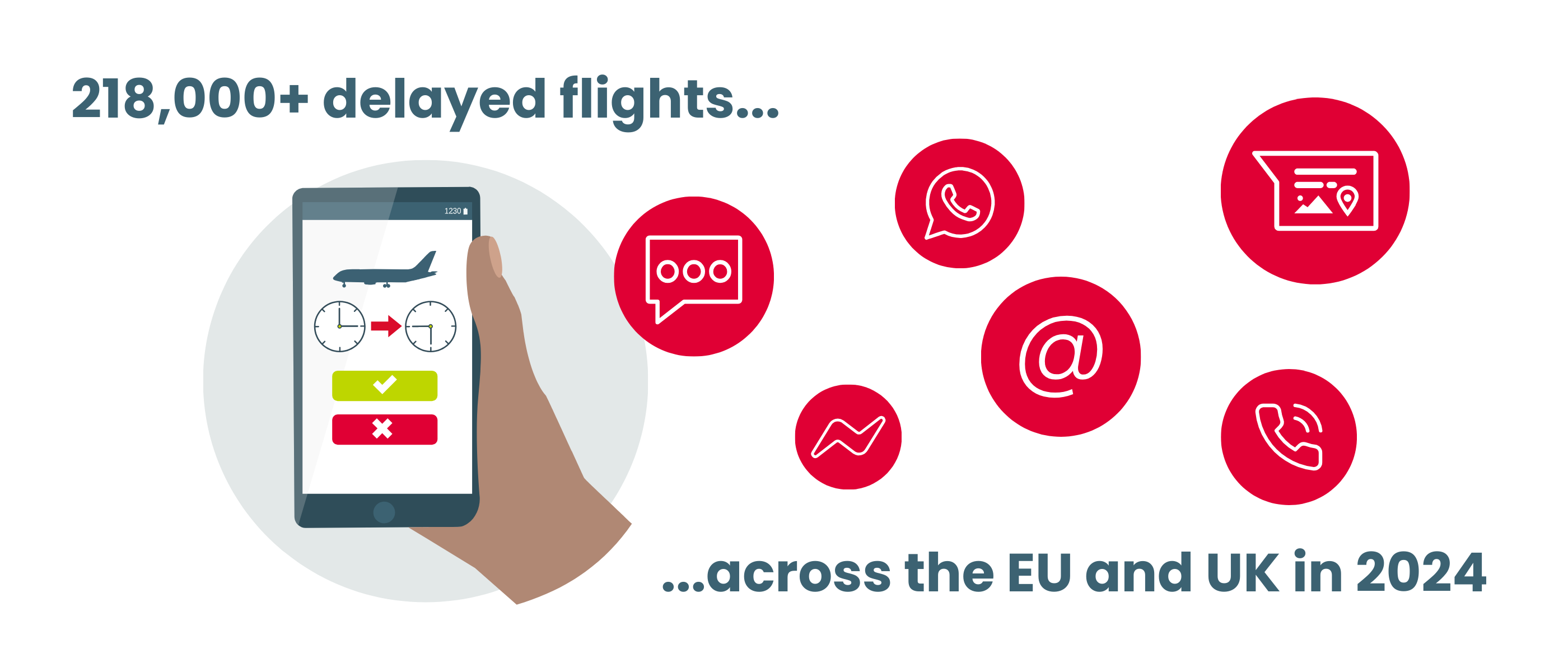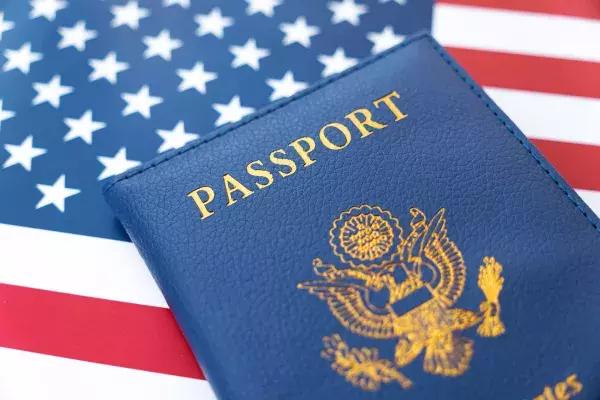01 August 2025 | Blog
Plans to cut EU261 compensation for flight delays: Is this a win for airlines?
01 August 2025 | Blog
Plans to cut EU261 compensation for flight delays: Is this a win for airlines?
EU ministers have agreed major changes to EU261 flight delay compensation rules, and airlines must act. With thresholds raised and payouts capped, the pressure is shifting from cost to customer experience.
What are the new EU261 flight delay compensation rules?
Passengers flying in the EU may soon receive less compensation for delayed flights. Following a vote by EU transport ministers in early June 2025, new thresholds and reduced payout amounts are set to replace the current EU261 rules.
Initially, this looks like a win for airlines. But in reality it transfers a new kind of pressure onto operational and customer service teams. When regulatory compensation is reduced, expectations don’t disappear.
This blog looks at what’s changing, how it could affect disruption management, and why proactive communication has never been more important.
Read to the end of this post for answers to some common questions on this topic and make sure you're up to date on all the latest changes.
Who qualifies for flight delay compensation under the new EU261 rules?
Under the new proposed rules agreed by EU ministers, delays of four hours or more will now be required before compensation is owed on short‑ and medium‑haul routes (up to 3,500 km). For long‑haul flights (over 3,500 km), the threshold moves to six hours. Compensation will be due at €300 for delays of 4 to 6 hours on short‑haul, and at €500 for delays over 6 hours on long‑haul routes. The current model (€250 to €600 for delays starting at 3 hours) will no longer apply.
These changes are part of a broader revision of passenger rights, designed to harmonise travel regulations across transport modes and reduce financial exposure for carriers. But for airlines, lower compensation doesn’t mean lower expectations. It simply shifts the focus from payout to experience.
Why will EU261 changes increase pressure on airline operations?
As these regulatory changes come into effect, airlines will need to manage a new kind of pressure that’s based on perception rather than policy.
While fewer passengers may be entitled to a refund under the proposed rules, more will be confused or frustrated by what’s changed. And the longer they’re left without answers, the more likely they are to reach out to your support teams, file complaints, or share their experience publicly.
Gemma Maidlow, Head of Product Solutions, 15below
This shift places even more emphasis on communication. Without the right tools in place, growing passenger uncertainty can lead to higher contact centre volumes, more friction between staff and customers, and increased reputational risk.
Communication, not compensation, will become the first line of defence.
Disruption is still happening, even if payouts don’t follow
In 2024, more than 218,000 flights across the EU and UK were delayed by at least three hours. If the new thresholds had been in place, a significant number of those flights would no longer qualify for any form of financial compensation.

This creates a gap between experience and entitlement. Passengers will still be delayed, disrupted, and disappointed. But they’ll have fewer options for formal redress unless airlines step in with proactive service.
Take control of delays with proactive communication and service recovery
There is a clear opportunity here: to go beyond regulation and deliver an experience passengers remember for the right reasons. With the 15below IROPS Dashboard, your airline can consolidate flight-event data into a single, real-time view. This gives your team immediate insight into developing issues and the tools to act quickly.
Disruptions can be manually triggered when needed, so nothing is missed if your upstream system doesn’t detect the delay. Custom business rules and operational checklists ensure that every alert triggers the right actions, delivered consistently across your network.
Built with input from JetBlue’s operations team, the IROPS Dashboard is designed for real-world, high-volume airline environments. It gives your teams the clarity and control they need without adding complexity. And it has been designed so that it can be implemented and ready to use in a matter of weeks.
The enhanced notification workflows make it simple to send automated, hyper-personalised messages via email, SMS, app, or WhatsApp. Every message is logged in the system, and with up to seven years of disruption reporting available, your airline remains audit-ready at all times.
What can airlines offer passengers when compensation isn’t required?
Reduced legal payouts don’t have to mean reduced support. Our partnership with iCoupon enables airlines to issue refreshment vouchers automatically to delayed passengers, allowing them to get a drink or meal in the airport without queuing or waiting for approval.
It’s a solution already proven to work at scale. In our case study with Ryanair, we show how automated vouchering allowed Europe’s largest airline to offer immediate compensation during disruption. The result was reduced pressure on frontline teams and higher passenger satisfaction.
This kind of service recovery shows you care, even when you’re not legally required to compensate. It reduces anxiety, deflects inbound contacts, and demonstrates control in a moment of disruption. And perhaps most importantly, it helps build long-term trust and loyalty.
How can airlines stay compliant with changing EU261 rules?
The proposed EU rule changes are designed to reduce compensation costs. But for airlines that commit to delivering an exceptional customer experience, the real opportunity lies in doing more, not less.
Because when you get in touch and offer support proactively, putting your customer at the heart of the operation and look for ways to making their journey a little easier, your passengers will remember you for all the right reasons. And with automated, hyper-personalised messaging from 15below, you can do it at scale without putting pressure on your teams.
What tools do airlines need for effective disruption communications?
EU261 is potentially changing, and your disruption communications need to change with it. These changes aren’t just a regulatory shift, they’re a wake-up call. Airlines that invest in smarter disruption management and proactive passenger communication will lead the way. With the 15below IROPS Dashboard, you can turn uncertainty into confidence, and keep passengers informed, loyal, and satisfied, no matter what.
Frequently Asked Questions on EU261 changes:
1. What are the new EU261 flight delay compensation rules for 2025?
Under the potential draft update, compensation may only be payable after 4-plus-hour delays on short- and medium-haul routes (≤ 3,500 km) and 6-plus-hour delays on long-haul routes (> 3,500 km). Payouts may be capped at €300 for 4–6 hour short-haul delays and €500 for delays beyond six hours on long haul.
2. Do the 2025 EU261 changes mean airlines no longer need to support delayed passengers?
No. While legal payouts may shrink, passenger expectations remain high. Airlines that communicate proactively, offer timely updates, and provide gestures such as refreshment vouchers will still protect satisfaction and reduce complaint volumes.
3. When will the updated EU261 compensation rules come into force?
The EU Parliament is expected to vote on the legislation in late 2025, with implementation likely to occur 12–18 months after this. Airlines should prepare processes and systems now to stay compliant from day one.
4. How can airlines minimise customer complaints under the new EU flight delay rules?
The most effective strategy is proactive, multi-channel communication: send real-time delay notices, set clear expectations, and follow up with personalised service recovery (e.g., automated meal vouchers). This reduces inbound contact centre traffic and protects brand reputation.
5. What technology can help airlines automate disruption communication and service recovery?
Platforms like the 15below IROPS Dashboard consolidate live flight-event data, trigger automated messages via email, SMS, app, or WhatsApp, and integrate with voucher solutions such as iCoupon. That means faster alerts, consistent updates, and audit-ready records of every interaction.
6. Will the new EU261 thresholds affect compensation for missed connections?
Yes. Because the delay clock starts at the originating flight, longer thresholds (4 or 6 hours) will make it harder for passengers on multi-segment itineraries to claim compensation, further underscoring the need for airlines to offer proactive assistance and rerouting options.




